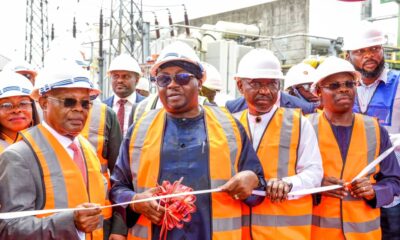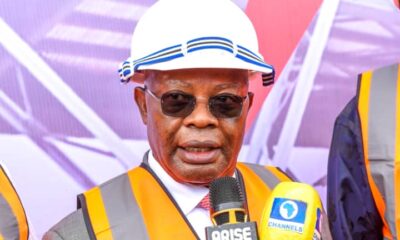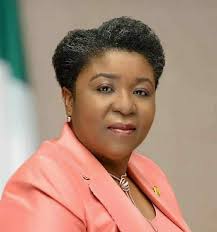Business
Council Welcomes UN’s Adoption Of 17 SDGs
The African Ministers’ Council on Water (AMCOW) has welcomed the UN’s adoption of the 17 Sustainable Development Goals (SDGs) which aim at eradicating extreme poverty and hunger by 2030.
This is contained in a statement by Mr Oseloka Zikora, Head of Communication of AMCOW and made available to newsmenon Sunday in Abuja.
The statement said the council welcomed the good news of all the SDGs, and in particular, Goal six solely dedicated to “ensure availability and sustainable management of water and sanitation for all by 2030.
“One hundred and ninety-three world leaders met at the United Nations General Assembly and approved 17 SDGs to replace the Millennium Development Goals which will expire in December 2015.’’
It congratulated the water and sanitation sector community for celebrating the inclusion of a dedicated water security and sanitation goal, saying without water, these goals could not be achieved.
It quoted AMCOW President, Mr Amadou Mansour-Faye, as saying that the centrality of sustainable management of water and sanitation in ending global poverty and ensuring sustainable development was not up for further debate.
“The benefits extend well beyond the water and sanitation domain to ensuring increased agriculture and food production, energy security, and better education for our teeming populations,’’ Mansour-Faye, Senegal’s Minister for Hydraulic and Sanitation said.
The statement noted that AMCOW played a significant role in the global advocacy for a distinct Water Security and Sanitation Goal.
Such role, it said, was based on the firm belief that this was primarily essential for ensuring secure, productive and sustainable water for all purposes, sanitation and hygiene interventions.
The statement also said that the integrated delivery of sustainable water and sanitation and hygiene interventions were pre-requisites for sustainable socio-economic development and the achievement of good health outcomes.
It said AMCOW’s Executive Secretary, Mr Bai Mass Taal, noted that development goals for poverty reduction and food security, energy and others could not be met without sustainable water resources management and sanitation.
“I am glad that AMCOW worked with partners to advocate for a water and sanitation goal right from the beginning.
“I recall with great pride the side event on water and sanitation chaired by Africa’s Goodwill Ambassador on Water and Sanitation, Liberia’s President Ellen Johnson Sirleaf.
“That event was organised by AMCOW with partners during the UN Post 2015 High Level Panel.
“This gave the water community’s call for a dedicated goal the needed impetus,’’ it quoted Taal as saying.
It added that “coming from an era of implementing MDGs and learning from our experiences, especially our success and failures, I believe we have an idea of what it will take to achieve the SDGs.
“I believe African citizens shall not forgive us as political leaders, technicians and development experts, if we fail to deliver by 2030 the commitments that our heads of state and government have agreed and signed’’.
AMCOW was formed in 2002 in Abuja, Nigeria, primarily to promote co-operation, security, social and economic development and poverty eradication among member states.
It is to achieve that through effective management of the continent’s water resources and provision of water supply services.
Business
$5bn Train 7 Project 80% Complete -NCDMB
The Board stated this in a statement released by its Corporate Communications Directorate to newsmen, recently, during the inauguration of 140 trainees for the Train 7 Project.
The trainees had undergone the Nigerian Content Human Capacity Development (NC-HCD) programme it organised in partnership with the Nigeria Liquefied Natural Gas (NLNG) Limited in Port Harcourt, the Rivers State capital.
The Tide gathered that the training programme was an intensive three-month Advanced NC-HCD Programme for the US$5 billion NLNG Train 7 Project on Bonny Island, Rivers State.
The trainees, The Tide further learnt are graduates in different academic disciplines who have completed a 12-month Basic Training Programme in diverse oil-and-gas-industry-related skill sets and are now set for an on-the-job phase which includes active hands-on participation in operational areas such as Turn Around Maintenance (TAM), Commissioning, and Desktop Programmes.
The Corporate Communications Directorate of the NCDMB told The Tide that in November 2024, a set of 331 trainees under Batch A of the NLNG T7 HCD Training Programme began capacity development in facility management, engineering, Information and Communication Technology (ICT), Health Safety and Environment (HSE), Quality Assurance and Quality Control, as well as welding and fabrication.
According to the Board, additional 77 trainees under Batch B of the same Training Programme began capacity development in data analytics and supply chain management among several other fields relevant to the operations of the oil and gas industry.
While addressing the trainees and trainers who were drawn from the Oil and Gas Trainers Association of Nigeria (OGTAN), Management Personnel of the NCDMB and NLNG, the Executive Secretary of NCDMB, Engr Felix Omatsola Ogbe, said the Advanced NC-HCD training is more than a milestone.
“The NC-HCD training programme is an expression of the collective commitment of the Board and the NLNG to nurturing world-class Nigerian professionals who will shape the future of our oil and gas industry.
“The Board has remained steadfast in its conviction that Human Capital Development is a critical investment in the sustainability and competitiveness of Nigeria’s oil and gas value chain”, the NCDMB boss said.
Business
Ageing Aviation Workforce: Minister Urges Youth Grooming For Replacement
He said the situation has resulted in widened knowledge gaps and operational challenges.
As a globally regulated sector, he said it was important that stakeholders put measures in place to attract the talents required to move the industry forward.
Keyamo, therefore, called on stakeholders in the industry to be deliberate in identifying, encouraging, nurturing and harvesting young talents to ensure a sustainable supply of manpower to the aviation sector.
Director of Public Affairs and Consumer Protection of the FAAN, Mrs Obiageli Orah, in a release made available to aviation correspondents, noted that the Minister deemed it necessary to attract the right quality of human resources required to move the sector forward.
“As a globally regulated sector, it is important that stakeholders put measures in place to continually attract the right quality and quantity of human resources required to move the industry forward.
“It is important to note that organising training programmes are avenues through which we can breed, nurture, and harvest such human resources.
“One of the critical challenges facing the industry is the ageing and retiring workforce, leading to widened knowledge gaps and operational issues.
“Training programmes, I believe, is among other things designed to make aviation appealing to the younger generation, while encouraging them to develop interest in taking up a career in the industry”, the statement stated.
Meanwhile, some aviation stakeholders have expressed concerns of countless young Nigerians who seek to make their mark in aviation, tourism, and the wider transport ecosystem but often face steep barriers to entry.
According to them, lack of access, limited mentorship, financial constraints, skill mismatches, and systemic gaps, among others, have posed some constraints to them.
Business
Ogbe Gets Appo Board Appointment
The Tide gathered that by the appointment, Ogbe becomes Nigeria’s representative on the Board of the 18-member continental body, which has its headquarters at Brazzaville, Republic of the Congo.
Ogbe was picked for this role by the Minister of State for Petroleum Resources (Oil), Senator Heineken Lokpobiri, who doubles as the Chairman of the NCDMB Governing Council.
The notice of the Executive Secretary’s appointment was conveyed in a congratulatory letter signed by the Director of Support Services, APPO, Mrs. Philomena Ikoko, on behalf of the Secretary-General of the organisation, Dr. Omar Farouk Ibrahim.
She applauded the NCDMB boss on the confidence reposed in him by the Minister, expressing her belief that he would make immense contributions to the development of the African oil and gas industry.
Mrs Ikoko stated that Ogbe was joining the Executive Board of APPO at a challenging time for the oil and gas industry, especially in Africa.
“Your appointment is a major call to duty for Nigeria and the continent. The secretariat will give you the support you will need to make a success of your assignment”, she said.
According to a statement by the Directorate of Corporate Communications and Zonal Coordination, the NCDMB played key roles in catalysing the operations of APPO and the development of local content in Africa.
The statement added that the board was providing institutional support and mentorship to several oil producing countries in their formulation of local content policies.
“The NCDMB initiated the African Local Content Roundtable (ALCR) and hosted the inaugural edition in Yenagoa, Bayelsa state, in June 2021, and the event was attended by key officials of APPO and other oil industry players.
“The idea for the Africa Energy Bank (AEB) was mooted by NCDMB’s officials at the event, as one of the strategies that would accelerate the growth of the African oil and gas industry and deepen local content.
“The Board also collaborated with APPO to host subsequent editions of the African Local Content Roundtable (ALCR), including the 2023 edition held at Abuja.
“The Africa Energy Bank, which APPO is setting up at Abuja, is aimed at pooling financial resources needed to fund big-ticket oil and gas projects across the continent, and bridge funding challenges currently impeding the development of the sector”, the NCDMB’S said.
Meanwhile, the APPO Secretary-General has said the Africa Energy Bank seeks to fund oil and gas projects across economies in Africa and help to plug critical financing gaps that exist through the continent’s over reliance on financiers from the West.
He added that each APPO member country is expected to raise $83 million with an objective of raising $5 billion capital for the establishment of the Bank.
The Tide learnt that recently Nigeria, Angola and Ghana have contributed their share capital for the African Energy Bank, which represents 44 percent of the trio’s contributions to the minimum capital that is required from oil producing countries in the continent.
It would be recalled that at the Nigerian Oil and Gas Opportunity Fair (NOGOF) held recently, the NCDMB’s Scribe confirmed that the agency was part of key institutions that pooled resources for the formation of the Africa Energy Bank.
Ogbe announced that the Bank will open for business before the end of the 2nd quarter of this year, 2025, expressing hope that it will create more funding availability for local oil and gas projects and companies.
Similarly, the Minister of State for Petroleum Resources (Oil), Senator Heineken Lokpobiri, had stated at the Offshore Technology Conference that Afrexim Bank has already raised $19billion for the take-off of the Africa Energy Bank.
According to him, $14 billion out of the funds represents the bank’s financial exposure on African oil and gas projects, with the additional $5 billion as take-off capital.
-

 News5 days ago
News5 days agoEx-president Buhari donates cow, rice to corps members in Daura
-

 Sports5 days ago
Sports5 days agoIkpeba Football Challenge Final Holds,’Morrow
-

 City Crime5 days ago
City Crime5 days agoDemocracy Day: Tinubu Addresses Joint N’Assembly Today
-

 News5 days ago
News5 days agoSenate Moves To Institutionalise June 12 Presidential Address
-

 Sports5 days ago
Sports5 days agoOkpekpe 10km Road Race Returns Next Year
-

 News5 days ago
News5 days agoIbas Presents ?1.48trn Rivers 2025 Budget To Reps, Laments Sabotage
-

 News5 days ago
News5 days agoFG Working Towards World-Class Public Service -Walson-Jack
-

 Sports5 days ago
Sports5 days agoTeam USA Booed After Another Whipping

